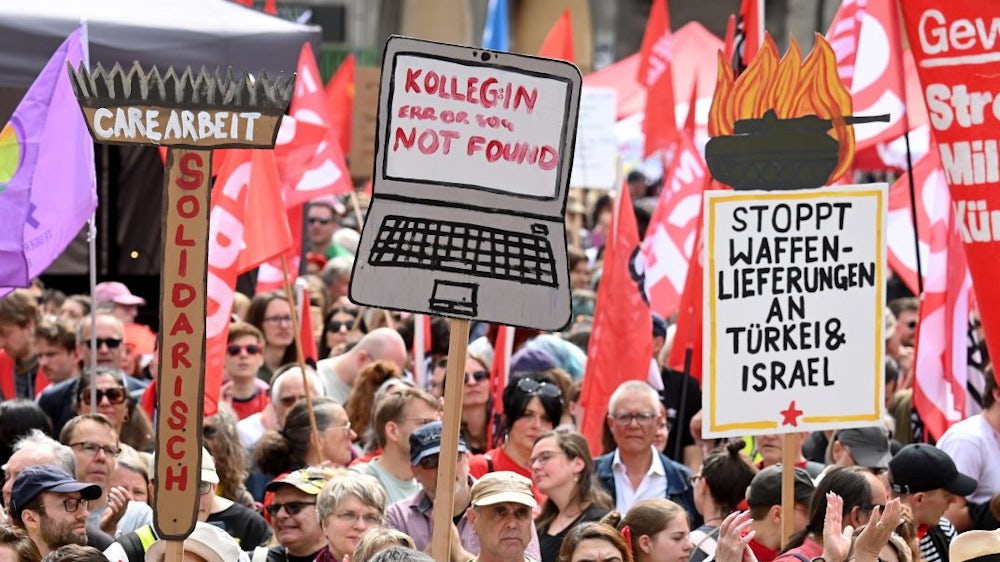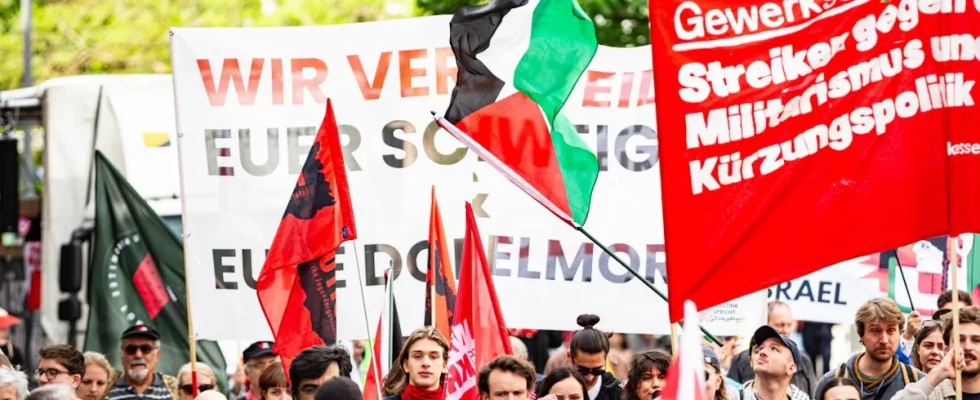According to estimates by the police and organizers, around 7,000 people followed the German Trade Union Confederation’s (DGB) call for demonstrations on Labor Day in Munich on Wednesday. After a procession from the employment agency on Kapuzinerstraße to Marienplatz, the demonstrators heard from, among others, Simone Burger, the Munich district chairwoman of the DGB, and Frank Werneke, federal chairperson of the Verdi union.
The procession initially offered a colorful overview of Munich’s left-wing scene: the member unions of the DGB marched along, the SPD and the Green Youth, Antifa, each recognizable by flags and banners. The German Communist Party, the Marxist-Leninist Party of Germany and the Socialist German Workers’ Youth are a good deal further to the left, but were in the minority with anti-capitalist and pacifist banners.
And then there was a relatively large group who identified themselves as opponents of the Israeli military strike after the Hamas terror of October 7, 2023 with slogans such as “No genocide in Gaza” and Palestinian flags.
DGB district leader Simone Burger said the groups had joined the demonstration: “They are not part of our movement and we do not share this opinion.” However, the right of assembly does not allow participants to be excluded as long as they do not cause any disruption – apart from a few shouts of “Viva Palestine”, nothing was heard from them. The police also said there was no reason for them to intervene.
That only happened later, after the demonstration and the speeches on Marienplatz. While the DGB family festival started there, among other things Ecco DiLorenzo and The Innersoul Fivee, around 1,200 pro-Palestinian demonstrators gathered a few meters away at the Rindermarkt. There were scuffles with a group that wanted to demonstrate for Israel. The police separated the two groups.
At the peaceful demonstration, the banners dealt with many of the topics that are currently determining the domestic political discussion – care, armaments, working hours, pensions – but also decidedly local phenomena: “Munich without a sports check is like Oktoberfest without beer.”

When he arrived at Marienplatz, Simon Burger welcomed delegations from those unions that are currently in collective bargaining or industrial action, demanded seven percent more wages for one industry and said that in the hospitality industry, every trained specialist should earn at least 3,000 euros gross. Burger’s speech ended with the recording of Queen’s “We will rock you”.
Verena Dietl came for the city, who is firstly in the SPD and secondly the social mayor. In her welcoming speech, she focused on what the city is already doing to ensure that Munich remains “affordable and affordable” – and what else it could and would do if the Bavarian state government made up of the CSU and Free Voters wasn’t so unreasonable and so on would be stingy, as Dietl thinks. Childcare, schools and affordable housing – issues that primarily concern families in Munich.
The Russian attack on Ukraine and the situation in the Middle East also featured at the event on Marienplatz. Verdi boss Frank Werneke mentioned it right at the beginning of his speech. When he spoke of the October 7 attack on Israel and called Hamas actors “terrorists,” he received some whistles and boos. Werneke continued: People mourn every death, in Ukraine, in Israel and also in Gaza.

From world politics we moved on to the general criticism of neoliberalism. According to Werneke, people are slowly realizing that this does not offer any solutions. That’s why there were 190,000 admissions to Verdi last year, 50,000 of them young people. “Our successes make our opponents nervous,” believes Werneke, referring primarily to the Union, FDP and employers’ associations. They therefore tried to restrict the right to strike “so that they have time to bring in enough strikebreakers.” This was well received by the crowd.
“Children in poverty are a disgrace for our country,” continued Werneke, who also spoke out in favor of basic child welfare in Munich. His attitude towards citizens’ money? If it is said that this is too high and that people would rather stay at home than work, then that is a sign that there are still far too many poorly paid jobs. Hence the demand for an increase in the minimum wage to 14 euros per hour next year.

